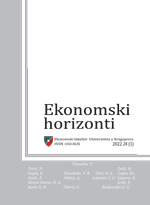INCOME INEQUALITY: DOES IT MATTER?
Alfred Wong and Christine Ribeiro
Arbokem Inc., Vancouver, Canada
Income inequality has gained considerable prominence worldwide in recent years. The growing discontent among the lower-income segment of industrialized societies is limited largely to resentment because of economic wealth being perceived to be steadily concentrating among fewer people. Quantified economic inequality does not necessarily mean the extreme deprivation of people, especially in Europe and North America. There will be no revolutionary-scale social unrest among the middle class if their expectation of satisfactory wellbeing is continually met. The connection between income inequality and poverty is uncertain because of the variable definition of poverty. The classical characterization of poverty is largely deficient as the actual economic hardships encountered by the lowest-income segment of society are never fully described in the socio-geographic context. What is deprivation in Europe and North America may be considered to be “luxurious” in economically poorer countries.
Keywords: exploitation, inequality, minimum wage, poverty, social justice
JEL Classification: D31, D33, D63, J31




